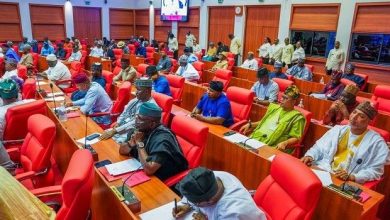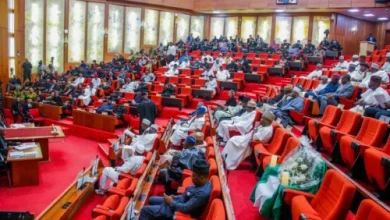Water pollution threatens health in Lagos, Kogi, Kebbi- NIHSA

The Nigerian Hydrological Services Agency (NiHSA) has raised concerns over water contamination in Lagos, Kogi, and Kebbi, calling for immediate action to protect public health and ensure safe water access.
NiHSA Director-General, Umar Mohammad, made the disclosure during a media briefing in Abuja on Wednesday.
According to Mohammad, the agency’s Water Quality, Flood Assessment, and Validation Report revealed high levels of heavy metals, microbial pollutants, and physical contaminants in groundwater and wells across the three states.
“The findings follow flooding events that have worsened water safety risks.
“In Lagos, the agency found excessive levels of nitrite, fluoride, lead, and cadmium, alongside significant microbial contamination,” he said.
Mohammad attributed the pollutants to industrial discharge, sewage infiltration, waste leaching, and corrosion of ageing plumbing systems.
He warned that the contaminants could cause neurological damage from lead, kidney problems from cadmium, blue-baby syndrome from nitrites, and bone and dental deformities from fluoride.
Mohammad also noted that floodwater intrusion and damaged drainage systems worsen exposure, increasing public health risks in the state.
“In Kogi, groundwater samples indicated high lead concentrations ranging from 0.12 to 0.56 milligrams per litre, with microbial contamination including E. coli, Streptococcus, and Salmonella.
“These conditions could lead to poisoning, cognitive impairment, and waterborne diseases if left unaddressed,” Mohammad said.
“In Kebbi, well water in several local government areas contained arsenic levels between 0.75 and 4 milligrams per litre, along with high microbial loads”.
He said long-term exposure could result in arsenicosis, liver damage, and severe intestinal infections.
Mohammad called on state governments and relevant agencies to take immediate measures to mitigate contamination, strengthen public sensitisation, and ensure communities have access to safe drinking water.
He emphasised that NiHSA’s forecasts, water-quality updates, drought outlooks, and flood assessment reports provide actionable information for governments, communities, and emergency responders.
“In a country where the North often faces drought while the South battles flooding, NiHSA’s work is critical in saving lives and enhancing national preparedness and resilience,” Mohammad said.
Also, Mr Sunday Husseini, Acting Director, Hydrogeophysics at NiHSA, said the agency has communicated findings to the Lagos, Kogi, and Kebbi state governments.
Husseini noted that Kebbi has agreed to collaborate on a comprehensive study of the state to identify hotspots of heavy metal contamination and integrate water treatment facilities into water supply schemes.
“Similar engagements are ongoing with Lagos and Kogi governments,” he added.
He said NiHSA is also developing hydrological regulations to reduce disaster risks and improve the management of water quality, availability, and distribution.
Husseini stressed that integrating water quality monitoring with flood forecasts strengthens national resilience and ensures Nigeria does not face disasters blindly.
He urged Nigerians to heed official warnings, follow safe water practices, and collaborate with authorities to reduce risks and protect public health.
NAN



